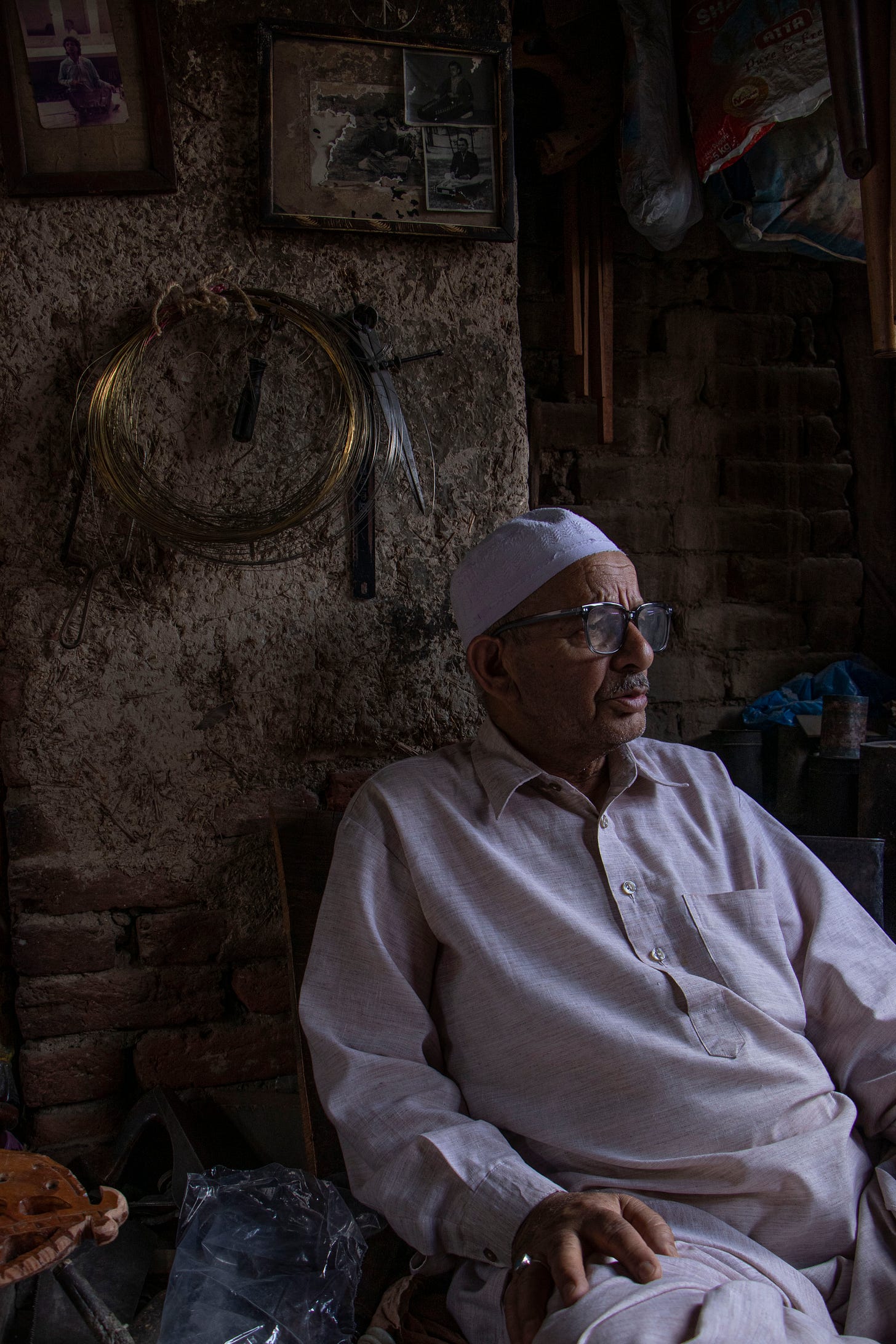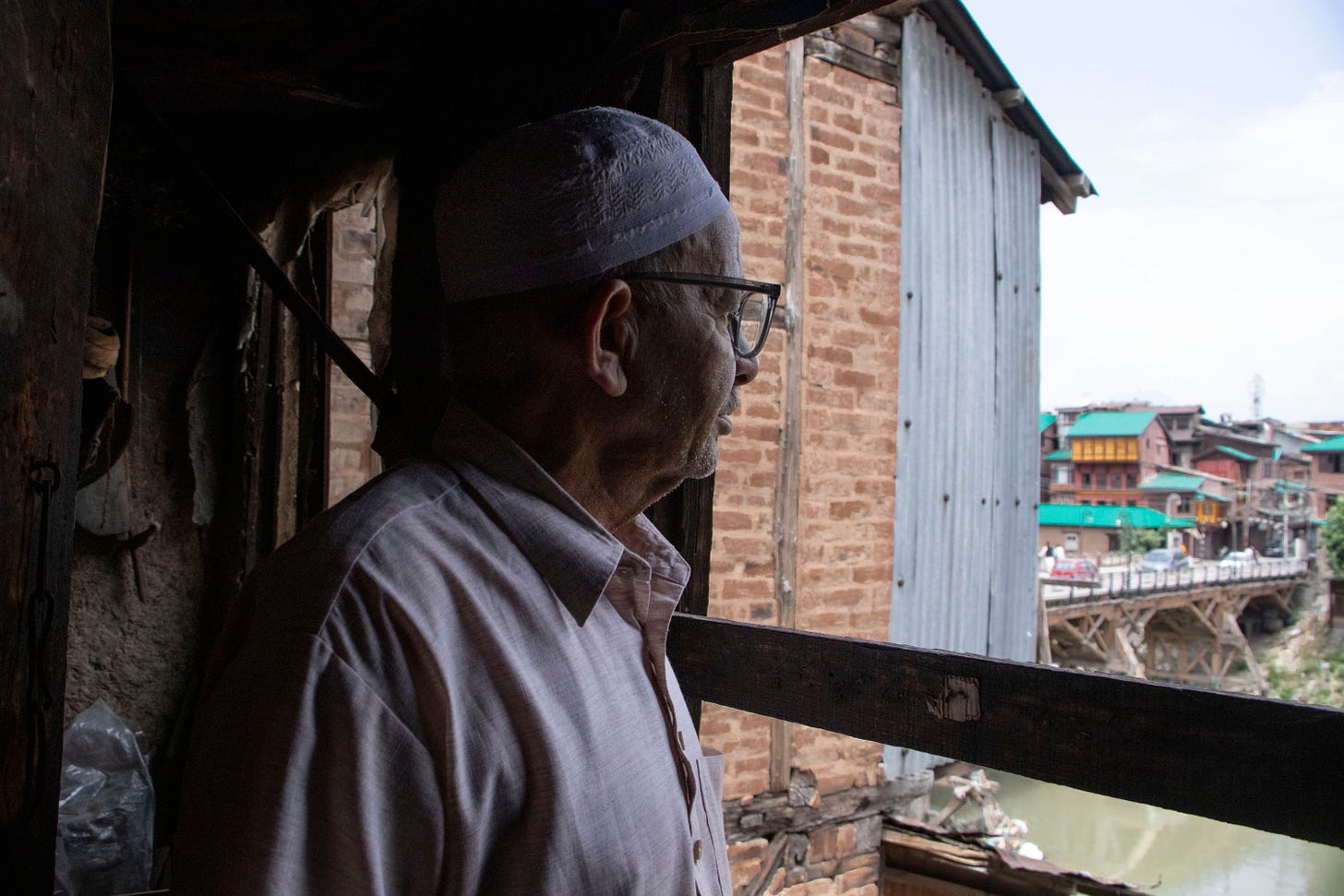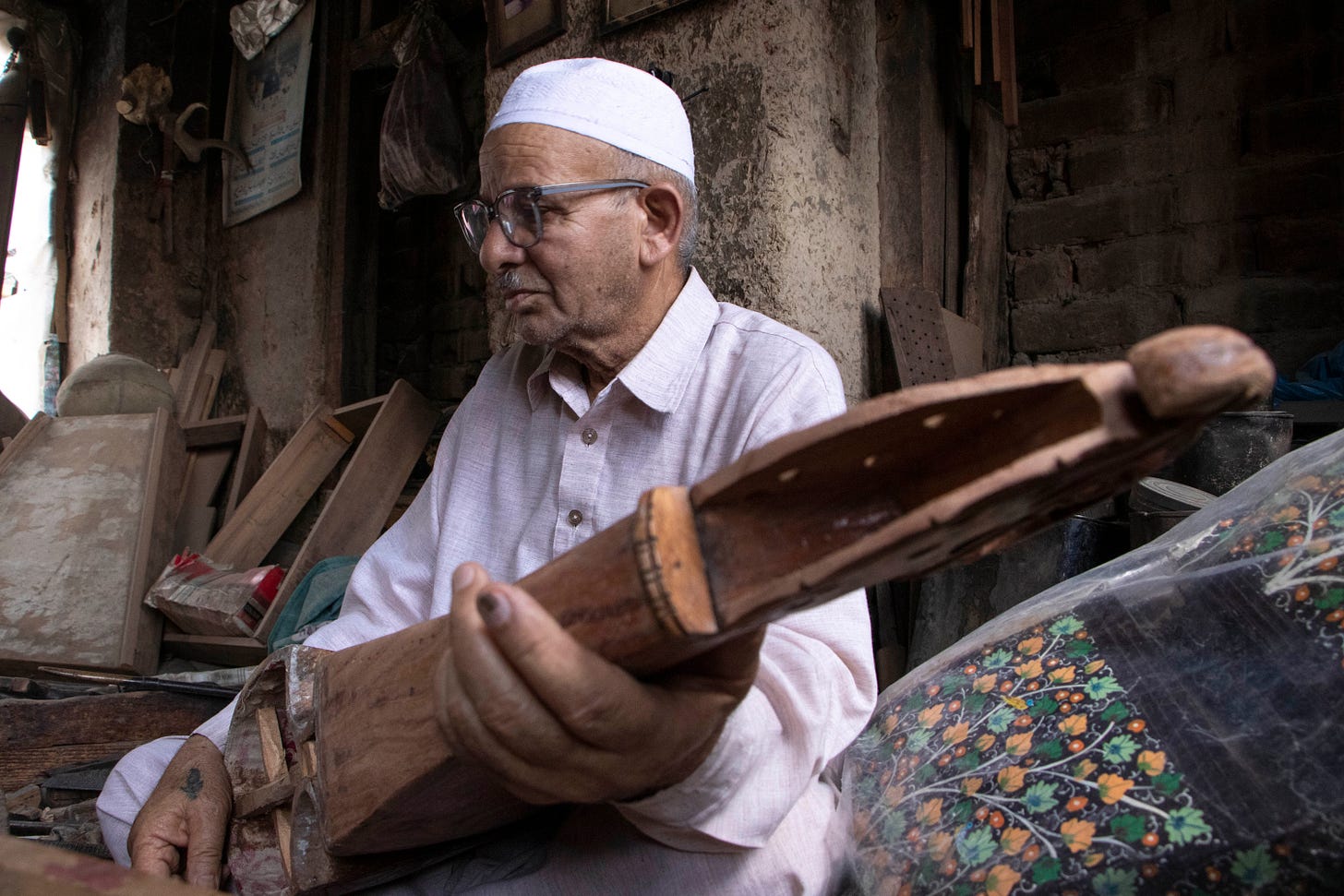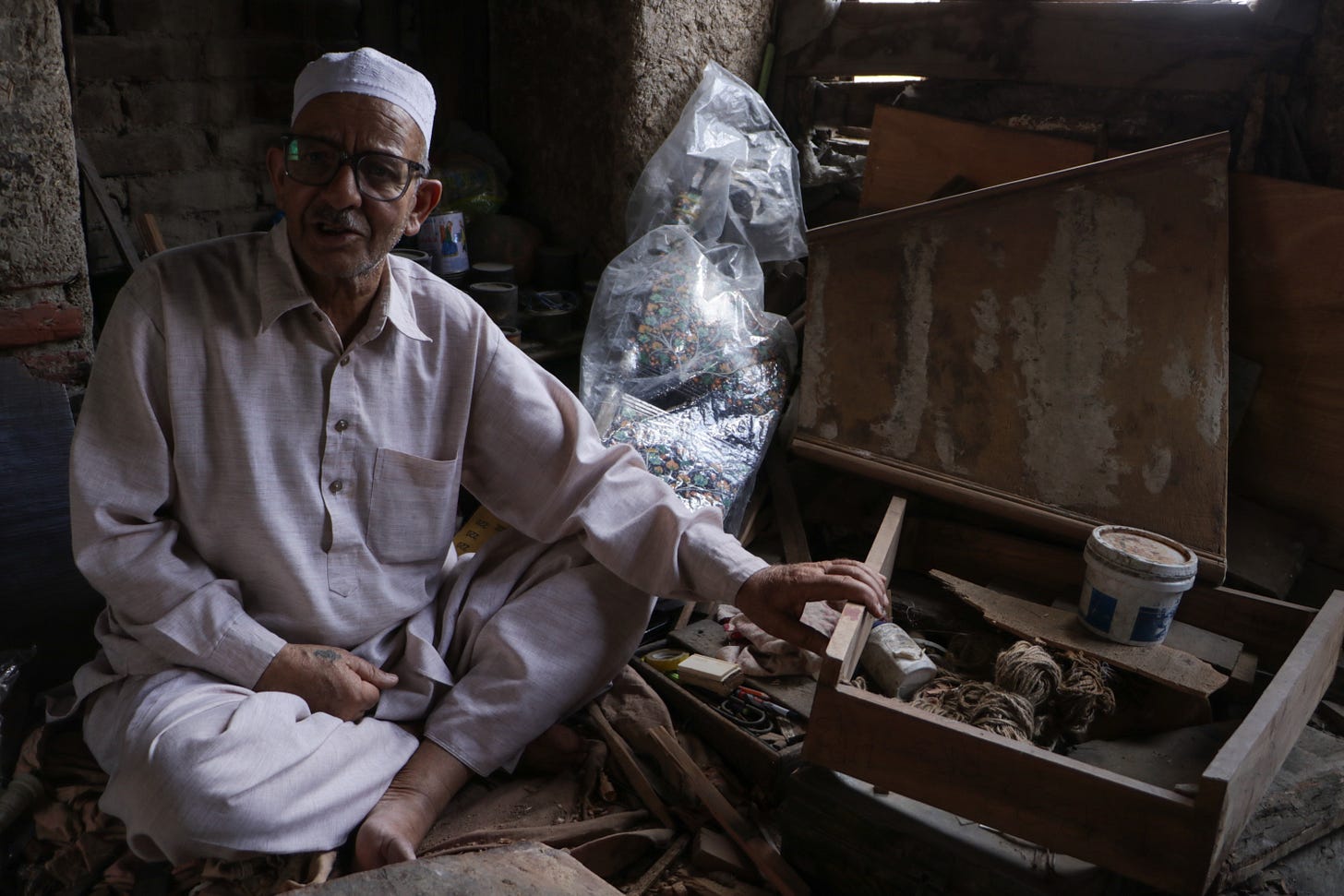The Last Santoor Maker of Kashmir
Srinagar's oldest Santoor maker crafts instruments for India's best musicians
(All photos by Adil Abass)
For more than six decades now, 85-year-old Ghulam Muhammad Zaz has been diligently crafting classical music instruments like Santoor and Rabab with his hands in a small workshop tucked away on the second floor of an old building adjacent to his ancestral home on the banks of the river Jhelum in Siraj Bazar area of Zaina Kadal in Srinagar’s old city. Having learned the craft from his father, grandfather and uncle since as early as the 1940s and 50s, Zaz is now the last remaining member of the eighth generation in his family associated with making these musical instruments. He is arguably the last remaining maker of Santoor left in Kashmir.
Wearing a khan dress and a white prayer cap with a ready smile on his face, the octogenarian artisan is in good health and still actively working on a few unfinished Santoors and Rababs in his workshop. Every day he steps up a cramped wooden staircase to open the old wooden door of his workshop filled with his hand tools and different pieces of wood and other required materials to make Santoors, Rababs, and Sitars.
A small window opens into the Jhelum river below as he sits beside it on a wooden seat surrounded by his hand tools and parts of Santoors and Rababs. There’s no cushion behind his seat - just another wooden sheet. He works for hours everyday to piece together Santoors and carve out Rababs, taking short breaks in between. Making a Santoor or a Rabab with his hands can sometimes take months to finish. To make a quality Rabab or a Santoor can take about two to four months, he says, or sometimes even six months, depending on the specific requirements and taste of musicians and other customers. He knows he is done with making one when he is satisfied with the final tuning, having achieved the right scale of the instrument. Over the years, Zaz has also taken several orders from musicians and other customers not just from Jammu and Kashmir but also from other states.
Zaz doesn’t use any machines and likes to work with his hands and his trusted tools. Some of them are over 100 years old which were used by his father and grandfather and which are still preserved by him in his workshop. Except for purely string-based instruments like the guitar, the Zaz family had the expertise to craft a number of classical music instruments such as Santoors, Sitars, Dilruba (a bowed instrument), Taus (a Persian bowed string instrument), Surbahar (bass sitar), Sārangī (a bowed, short-necked string instrument), and Tanpura (a long-necked, plucked, four-stringed instrument).
“Everything is carved by hand and no nails are used in making Santoors,” he emphasizes. “I do some carpentry work as well to shape the wood required for making Santoors and Rababs.”
The bespectacled octogenarian takes pride in the fact that his family has never approached government agencies for help or sought any kind of support from governmental or non-governmental agencies over all these decades. Their work was also not recognized by the government until last year when Zaz was awarded Padma Shri for his contribution to make classical Indian and Kashmiri musical instruments.
More than an award for him, he says he sees the Padma Shri award as an acknowledgment of the contribution made by his family, especially his father, grandfather and uncle who dedicated their lives to crafting classical musical instruments to the best of their abilities and skills.
“Whatever I have achieved or earned in my life is all because of this small workshop and all these small tools and wooden pieces you see scattered here,” the bespectacled octogenarian says while sitting on a wooden desk in his workshop surrounded by old and new wood pieces and numerous hand tools of different sizes. There are some very old pieces and parts of Sitars and Rababs hanging from a closed window.
Zaz says when his father, grandfather, and uncle were making traditional musical instruments through the 1950s and 60s onwards, they had a bigger workshop on the second floor and a shop on the ground floor that displayed their finished musical instruments and where customers would come to check out and buy instruments they liked. The Zaz family was a known name in making Indian classical and Kashmiri musical instruments like Sitar, Santoor, Dilruba, Tanpura, Rabab, Sarod (a lute-like string instrument), and Sarangi. The shop was eventually closed in the early 1990s after his father passed away and the situation deteriorated in the valley.
“Many artists and musicians from cities like Mumbai to Kolkata would often visit the workshop and give orders depending on their requirements,” he says. “And we never got any complaints about the quality of the instruments made by us.”
He says he never felt a need to approach successive governments to support him in keeping the craft alive. “We have never been dependent on the government or anyone till now,” he says proudly. “We have lived happily and earned enough from this work to support our families and educate our children.”
Zaz says they have had their loyal customers both in Kashmir and other states. “They recognized the quality of our work and respected our craft,” he says. “And they have paid decently for any instrument they bought from us.”
Famous Santoor players including Pandit Shivkumar Sharma and Pandit Bhajan Sopori, whose old framed photos with their Santoors adorn the workshop walls, have also played Santoors made by the Zaz family. Both the legendary Santoor players went on to popularize the Kashmiri musical instrument across India.
“Rabab has come here from Afghanistan but Santoor is purely a Kashmiri musical instrument,” claims Zaz . “The traditional Kashmiri Santoor has 100 strings but those used by Indian Santoor players have some slight modifications.”
After his father died in the early 1990s, Zaz says he was the only one left in the family to carry forward the family legacy of making musical instruments.
“The new generation is not interested in learning this craft,” he rues with a hint of disappointment in his voice, adding that he can’t teach the craft to anyone unless they’re really interested in going through the grind and have some basic knowledge of classical musical instruments and the passion required to make them.
“There is a lot of hard work and patience needed to learn this craft,” he says, adding that it’s not for everyone unless they have the desire to learn it. “Not many have the desire and patience to sit for hours to craft a small musical instrument and master this craft.”
None from his own family could take up the craft either. Zaz lives alone with his wife in his ancestral home. His three daughters are all married and well settled with their children.
Despite being the lone member from his family still making these classical musical instruments, Zaz never thought of retiring from his work or closing his workshop even in his mid 80s now. He says he wants to keep working till the end.
“This messy workshop is my happy space. It gives me sukoon (peace) like nothing else can,” he says with a gap-toothed smile before pausing to look out towards the river Jhelum flowing quietly beneath the window.
“This craft has given me and my family everything we needed,” he says after a brief pause.
“I will continue to work here as long as I can."
---
(A shorter version of this piece was originally published in Mint Lounge)









